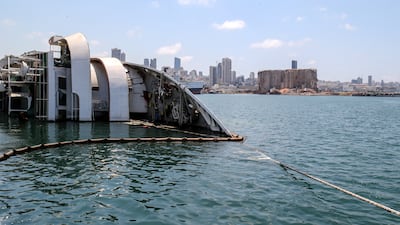Listen to the latest podcast on the Beirut blast here
Whether to heal or celebrate, anniversaries exist to remind us of a past event and how far we have come since. But for Lebanon, which today marks the solemn anniversary of the explosion at Beirut's port, little has changed.
The blast was one of the largest non-nuclear explosions in history and is estimated to have damaged more than 6,000 buildings. It killed at least 214 people. However, one year later, no one has been held accountable for it. Today, protests are set to be held throughout the city, not against a single responsible party, but a far more complex political establishment that has in no way atoned for its role in the devastation.
The investigation into the explosion remains stalled. But victims deserve to have the crisis not just told through their country's hopeless politics, but through their personal struggles as well. In the run-up to the anniversary, The National has been gathering such testimonies. Lebanese journalist Luna Safwan has written about how people are still uncovering new memories of the day, previously buried by trauma. Workers at the port's destroyed silos talked to Sunniva Rose about how their lives changed after the blast, and the effects of seeing nine of their colleagues die. Psychiatrist Dr Joseph Khoury has said he fears a new wave of trauma on the anniversary. Finbar Anderson, who himself was injured in the explosion, has recorded a four-part podcast on how the ammonium nitrate got to Lebanon.






The horror of August 4, 2020 unfolded in parallel on social media. The progressive catastrophe drew the world's attention to Lebanon's crisis, which had been underway long before the blast. It is a shame that only such an extreme event could do so. And while social media is a powerful tool for many to tell their stories, some are choosing not to use it today, with mental health advocates calling for a blackout to avoid triggering content and memories.
These personal traumas are aggravated by a lack of justice and the failure to make necessary changes to reassure the Lebanese that something like the blast could never happen again. Lebanon's new prime minister-designate, Najib Mikati, said earlier this week that he would not be able to secure his goal of forming a Cabinet line-up in time for the anniversary. Instead, and to little surprise, Lebanon's politicians continue to bicker about their own portfolios in a new administration.
This political failure is also blocking relief for Lebanon's collapsing economy. Foreign powers have said that government formation is a key condition for the country being granted financial aid. The UN says Lebanon needs almost $360 million to keep vital services afloat and ease what the World Bank has called one of the worst financial crises since the 19th century. French President Emmanuel Macron, who is leading the global campaign, is not optimistic, saying on Monday that the situation has only worsened.
Today's anniversary is not simply a moment for reflection, as it should be. It is yet another painful reminder of the complex crisis in which the country is trapped. One year on, it seems as if many more August 4 anniversaries will have to pass before Lebanon gets the answers and justice it deserves.













